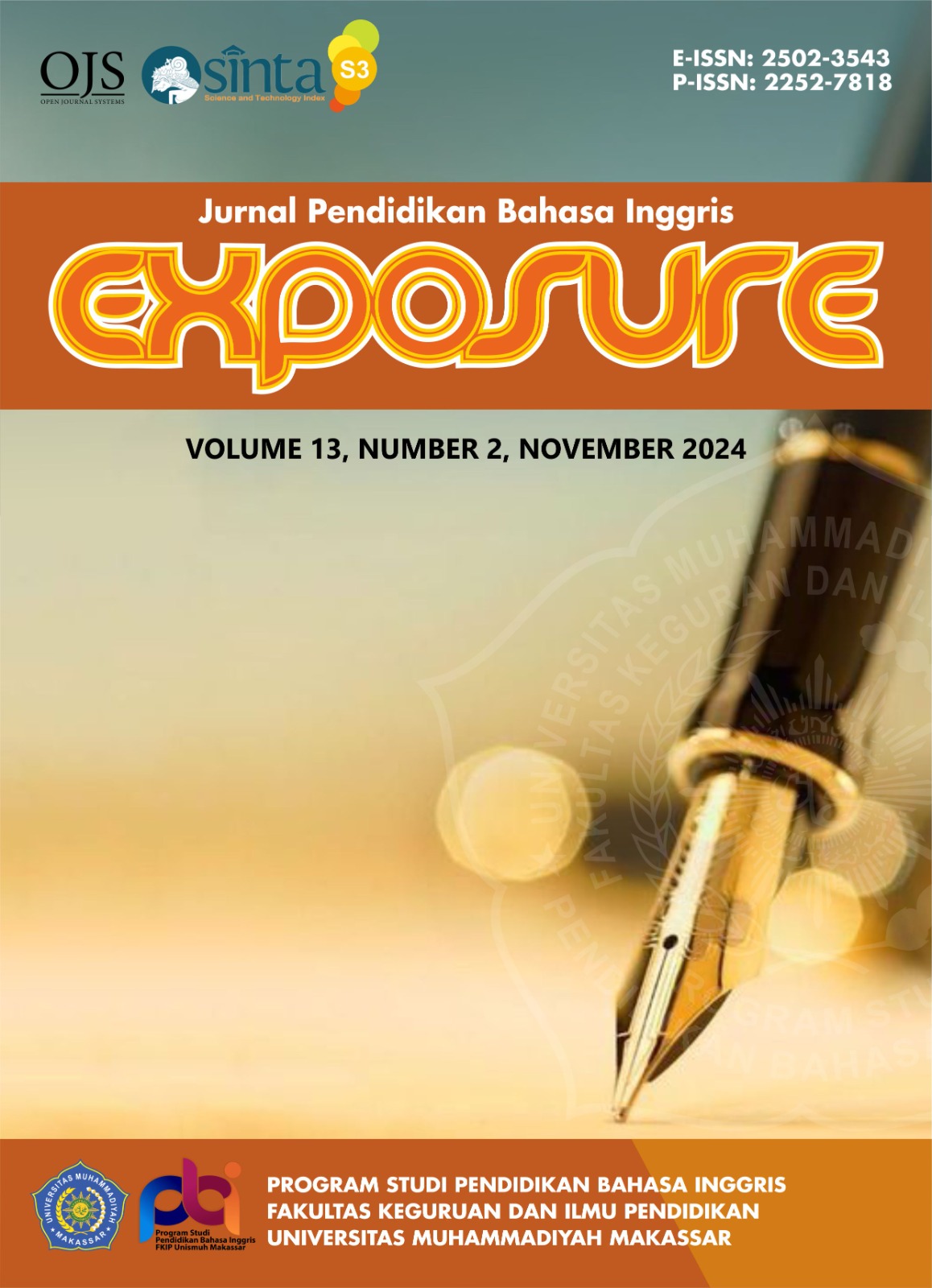STUDENTS’ PERCEPTION ON THE EFFECT OF ENGLISH SPEECH COMPETITION TOWARD SPEAKING SKILLS AT SMA ISTIQAMAH MUHAMMADIYAH SAMARINDA
DOI: https://doi.org/10.26618/exposure.v13i2.15090
High School Students, English Speech Competitions, Speaking Skills, Learning Styles, Curriculum Development.
Abstract
The development of speaking skills among high school students is essential for effective communication and future success. This study investigates students' perceptions of the impact of participating in English speech competitions on their speaking abilities at SMA Istiqamah Muhammadiyah Samarinda. Additionally, it explores the challenges that hinder students from maximizing the benefits of these competitions. Using a mixed-method approach, data were collected from students who participated in English competitions over the past two years. The research utilized questionnaires adapted from previous studies and semi-structured interviews to gather insights from the students. Supplementary data were obtained through documentation of students' assignments from the competitions. The findings reveal that English speech competitions significantly enhance students' speaking skills by increasing their confidence, enriching their vocabulary, and improving their pronunciation and fluency. However, factors such as limited practice opportunities, anxiety, and inadequate feedback mechanisms were identified as barriers to achieving the full benefits. This study highlights the importance of incorporating structured and supportive speech competition programs in the curriculum to foster better speaking skills among students.References
Al Hosni, S. (2014). Speaking difficulties encountered by young EFL learners. International Journal on Studies in English Language and Literature (IJSELL), 2(6), 22–30.
Bailey, K. M., & Savage, L. (1994). New ways in teaching speaking. https://www.academia.edu/download/52428203/New_Ways_Speaking_Part1_Jack_richard.pdf
Creswell, J. W., & Creswell, J. D. (2017). Research design: Qualitative, quantitative, and mixed methods approaches. Sage publications.
Derakhshan, A., Khalili, A. N., & Beheshti, F. (2016). Developing EFL Learner’s Speaking Ability, Accuracy and Fluency. English Language and Literature Studies, 6(2), 177. https://doi.org/10.5539/ells.v6n2p177
Kusrini, E. (2012). Teaching Speaking For Senior High School Students Using Cooperative Learning “Think Pair Share ‘.
Lawtie, F. (2004). Teaching Speaking Ability 2–Overcoming Classroom] Problems. Retrieved January, 10, 2018.
Littlewood, W. (2007). Communicative and task-based language teaching in East Asian classrooms. Language Teaching, 40(3), 243–249.
Lutviana, R. (2016). Speech Contest To Improve Studentsâ€Tm Fluency In Speaking. Jurnal Ilmiah Bahasa Dan Sastra, 3(2), 143–151.
Newton, J. M., & Nation, I. S. P. (2020). Teaching ESL/EFL listening and speaking. Routledge. https://books.google.com/books?hl=id&lr=&id=TJ_5DwAAQBAJ&oi=fnd&pg=PT5&dq=The+greatest+approach+to+gauge+progress+in+learning+a+second+or+foreign+language+is+to+hear+it+spoken,+as+this+is+the+most+crucial+aspect+of+the+process&ots=7HnRof-Gcr&sig=YhZsYxpAQmgbDdyrWErRBVn7h74
Nugent, P. (2018). A University ESS Speech Contest. http://54.64.16.112/dspace/handle/11470/738
Othman, M., Sahamid, H., Zulkefli, M. H., Hashim, R., & Mohamad, F. (2015). The effects of debate competition on critical thinking among Malaysian second language learners. Middle-East Journal of Scientific Research, 23(4), 656–664.
Riadil, I. G. (2020). A Study of students’ perception: Identifying EFL learners’ problems in speaking skill. IJELR: International Journal of Education, Language, and Religion, 2(1), 31–38.
Suryani, I., Suarnajaya, W., & Pratiwi, A. (2020). Investigating the Inhibiting Factors in Speaking English Faced by Senior High School Students in Singaraja. International Journal of Language Education, 48–58. https://doi.org/10.26858/ijole.v4i2.10054
Templeton, M., & Fitzgerald, S. S. (1913). Schaum’s quick guide to great presentations. McGraw-Hill Education.
Thornbury, S. (2005). How to teach speaking. Longman. https://thuvienso.hoasen.edu.vn/handle/123456789/9767
Downloads
Published
How to Cite
Issue
Section
License
Authors who publish with this journal agree to the following terms:
In order to assure the highest standards for published articles, a peer review policy is applied. In pursue of the compliance with academic standards, all parties involved in the publishing process (the authors, the editors and the editorial board and the reviewers) agree to meet the responsibilities stated below in accordance to the Journal publication ethics and malpractice statement.
Duties of Authors:
- The author(s) warrant that the submitted article is an original work, which has not been previously published, and that they have obtained an agreement from any co-author(s) prior to the manuscript’s submission;
- The author(s) should not submit articles describing essentially the same research to more than one journal;
- The authors(s) make certain that the manuscript meets the terms of the Manuscript Submission Guideline regarding appropriate academic citation and that no copyright infringement occurs;
- The authors(s) should inform the editors about any conflict of interests and report any errors they subsequently, discover in their manuscript.
Duties of Editors and the Editorial Board:
- The editors, together with the editorial board, are responsible for deciding upon the publication or rejection of the submitted manuscripts based only on their originality, significance, and relevance to the domains of the journal;
- The editors evaluate the manuscripts compliance with academic criteria, the domains of the journal and the guidelines;
- The editors must at all times respect the confidentiality of any information pertaining to the submitted manuscripts;
- The editors assign the review of each manuscript to two reviewers chosen according to their domains of expertise. The editors must take into account any conflict of interest reported by the authors and the reviewers.
- The editors must ensure that the comments and recommendations of the reviewers are sent to the author(s) in due time and that the manuscripts are returned to the editors, who take the final decision to publish them or not.
Authors are permitted and encouraged to post online a pre-publication manuscript (but not the Publisher’s final formatted PDF version of the Work) in institutional repositories or on their Websites prior to and during the submission process, as it can lead to productive exchanges, as well as earlier and greater citation of published work (see The Effect of Open Access). Any such posting made before acceptance and publication of the Work shall be updated upon publication to include a reference to the Publisher-assigned DOI (Digital Object Identifier) and a link to the online abstract for the final published Work in the Journal.














